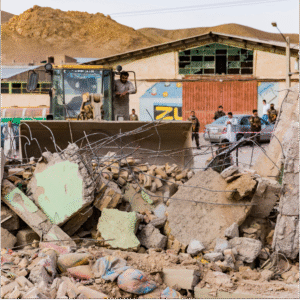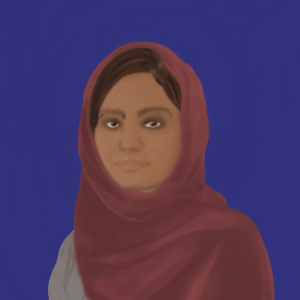17-year-old Asal from the Afghanistan Newsroom explains the psychological and emotional toll of war on the people of Herat

Damaged police checkpoint after a bomb attack in Kamar Kalagh, Herat, Afghanistan, 2021.
Picture by: Imago | Alamy
Article link copied.
April 4, 2025
Afghanistan grapples with a mental health crisis from war and trauma
In the historic city of Herat, the third largest city in Afghanistan, the scars of war are not only physical and economic but deeply psychological. Herat has been a region long marked by significant conflicts, such as the brutal suppression of the 1979 Herat uprising.
Harbingers’ Weekly Brief
Impact of war on mental health
Years of conflict have left residents grappling with the emotional toll of ongoing violence, creating a tense atmosphere that challenges their daily lives. As a result, mental health issues have emerged as one of the most critical concerns in the region.
The emotional cost of war in Herat is immense. Displacement, trauma from loss, and the constant fear of violence have left many people struggling with anxiety, depression and post-traumatic stress. For individuals like local resident Safiullah*, now aged 30, these emotional scars are profound.
Safiullah recalls the first sounds of conflict that echoed throughout the city: “I felt that the world was no longer as it once was. That overwhelming sense of uncertainty changed a deep part of my being.” His words reflect the profound emotional toll that war has on individuals, leaving them with a constant sense of fear and anxiety.
Safiullah’s story, however, is not one of total despair. He has found ways to adapt and cope with the anxiety and insecurity around him.
“Every day, I face both small and significant challenges,” he says. “Yet, I have learned to appreciate every moment of peace and hope. I believe that even in the heart of darkness, the light of hope endures.”
His resilience is a testament to human strength in the face of adversity. Yet, this emotional fortitude is not always enough. Many residents of Herat struggle with long-term mental health issues, with limited access to psychological support and treatment.
Current support systems
The Afghan healthcare system is facing severe challenges, with many facilities closing due to funding shortages. Access to medicine is inconsistent, and the Taliban’s policies, including bans on women’s education and medical training, exacerbate the crisis.
In response to the growing mental health crisis, some local institutions and charities have begun offering psychological counselling and educational sessions. For example, UNHCR (the United Nations’ refugee agency) offers a safe space for women, girls, men and boys to confidentially discuss their issues with trained professionals.
However, these efforts remain limited, and there is a significant gap in comprehensive mental health programmes. The region’s lack of resources, combined with a shortage of trained professionals, makes it difficult to provide adequate care.
Kawa*, a local community leader, emphasises the need for accessible mental health services. “People are suffering silently,” he says. “The pain of loss, fear, and hopelessness is overwhelming, and we need to do more to offer support.”
Improving access to psychological services, creating supportive environments, and reducing the stigma surrounding mental health are crucial steps toward recovery. As Safiullah points out, the community’s healing process requires collective action and understanding.
Safiullah’s journey underscores the urgent need to address mental health in times of crisis. The emotional wounds caused by war are as significant as the physical consequences, and they demand a comprehensive approach to recovery. By investing in mental health infrastructure and fostering empathy, the people of Herat can begin to heal and look toward a future of peace and hope.
* Names have been changed to protect identities
Written by:

Afghanistan
Contributor
LEARN Journalism Club
Illustration by Yuliia Muliar
Born in 2007, Asal is currently studying journalism through the joint project between Harbingers’ Magazine and LEARN Afghan.
Deeply passionate about cardiology, she hopes to become a cardiologist in the future. In her free time, Asal enjoys reading psychology books and exploring health-related topics.
Asal speaks Dari and English.
Due to security concerns the author’s image and surname have been omitted
Edited by:

🌍 Join the World's Youngest Newsroom—Create a Free Account
Sign up to save your favourite articles, get personalised recommendations, and stay informed about stories that Gen Z worldwide actually care about. Plus, subscribe to our newsletter for the latest stories delivered straight to your inbox. 📲
© 2025 The Oxford School for the Future of Journalism


